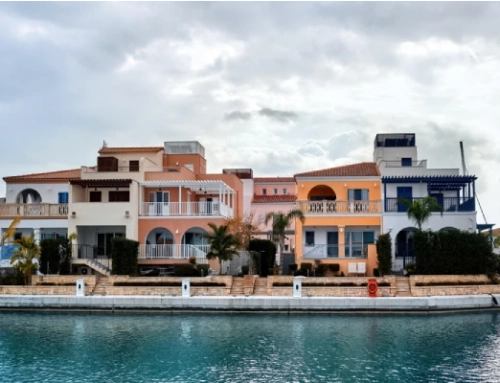Dubai’s real estate market has long been an attractive destination for both local and international property investors. Its dynamic growth, stunning skyline, luxurious properties, and favorable investment environment make it a prime spot for those looking to buy a house. Whether you’re interested in a luxury home or a more affordable property, understanding the process of purchasing real estate in Dubai is key to making a successful investment. If you’re wondering how can I buy a house in Dubai, here’s a comprehensive guide to help you navigate the process.

1. Can Foreigners Buy Property in Dubai?
The first question that many investors ask is whether they, as non-residents, can purchase property in Dubai. The good news is that Dubai allows foreign nationals to buy property in designated freehold areas. These areas include some of the city’s most iconic locations such as Damac Hills, Ras Al Khor, Town Square, to name a few. In freehold areas, you can own the property outright, which makes Dubai an attractive destination for global property investors.
2. Steps to Buying a House in Dubai
The process of buying a house in Dubai can be straightforward if you understand the key steps involved. Here’s a general overview of the process:
Step 1: Choose Your Property Type and Location
Dubai offers a wide range of properties, from affordable homes to luxurious villas. Whether you’re looking for a luxury home in Dubai or a more budget-friendly option, it’s important to consider the location, your investment goals, and the type of property that suits your needs. If you’re targeting high-end properties, areas like Palm Jumeirah and Downtown Dubai are ideal.
Step 2: Hire a Real Estate Agent
While it’s possible to buy a house in Dubai without an agent, hiring a top real estate agency in Dubai can streamline the process. Real estate agents have in-depth knowledge of the market and can help you find the perfect property. Agencies specializing in luxury real estate in Dubai are particularly useful if you’re looking for high-value homes or exclusive properties.
Step 3: Secure Financing
While foreign investors can buy property in Dubai, securing financing can be a bit more complicated than in other markets. Banks in Dubai offer mortgage options, but as a foreigner, you may be required to pay a larger down payment (usually 20-30% of the property price). It’s important to explore your financing options before committing to a property purchase.
Step 4: Make an Offer
Once you’ve found the right property, your real estate agent will help you make an offer. If the seller accepts, you’ll need to pay a deposit (typically 10% of the property price). This deposit secures the property and begins the legal process.
Step 5: Finalize the Sale
After the offer is accepted and the deposit paid, the sale will proceed to the Dubai Land Department (DLD), where the transfer of ownership will take place. You will need to sign the sale agreement and pay the remaining balance, which is usually done through a bank transfer. Additionally, there are transaction fees involved, such as the DLD registration fee and agency fees.
3. Houses for Sale in Dubai: What to Look For
When browsing houses for sale in Dubai, it’s essential to consider various factors that will affect your investment. Whether you’re looking for a family home or a property to rent out, here are some things to keep in mind:
- Location: As with any property investment, location is crucial. Areas like Town Square, Damac Hills, and Ras Al Khor are prime locations that are highly sought after.
- Property Type: Dubai offers a variety of property types, including villas, townhouses, and apartments. Villas are perfect for those seeking privacy, while apartments in high-rise buildings are ideal for those who prefer city living.
- Price: While Dubai offers luxury properties, there are also more affordable options for those looking to buy property in Dubai on a budget. Work with your real estate agent to ensure you’re getting the best value for your money.
- Amenities: Consider the amenities offered by the property and surrounding area. Does the community have schools, hospitals, retail centers, and public transport access? These factors are important, especially for long-term investments.
4. Legal Considerations When Buying Property in Dubai
Understanding the legal requirements for buying property in Dubai is vital. As a foreigner, you’ll need to ensure you comply with the following legal aspects:
- Residency: Owning property in Dubai can sometimes offer the possibility of obtaining a residency visa, depending on the value of the property. For example, Dubai offers a Golden Visa for investors purchasing property worth over AED 2 million.
- Title Deed: The transfer of property ownership in Dubai requires the issuance of a title deed, which is handled by the Dubai Land Department (DLD). Make sure that the property is free from any legal encumbrances before making a purchase.
- Freehold vs. Leasehold: In some areas of Dubai, properties are available on a leasehold basis, where you only have the right to use the property for a fixed period (typically 99 years). Freehold properties allow full ownership, which is the preferred choice for most investors.
5. Buy Property in Dubai for Investment
Dubai’s real estate market is known for providing high returns on investment, particularly in popular areas. Many investors purchase properties to buy property in Dubai for rental income or future resale. The city offers strong demand for rental properties, especially in prime locations, and investors can expect rental yields between 5-7%, making it a lucrative investment option.
Conclusion
Buying a house in Dubai can be an exciting and rewarding experience, whether you’re looking to invest in luxury real estate or find a family home. By understanding the buying process, legal requirements, and market trends, you can make an informed decision that suits your needs. Whether you choose to work with a real estate agency in Dubai or browse the available houses for sale in Dubai, the key is to research thoroughly and plan ahead to ensure your investment is successful.





